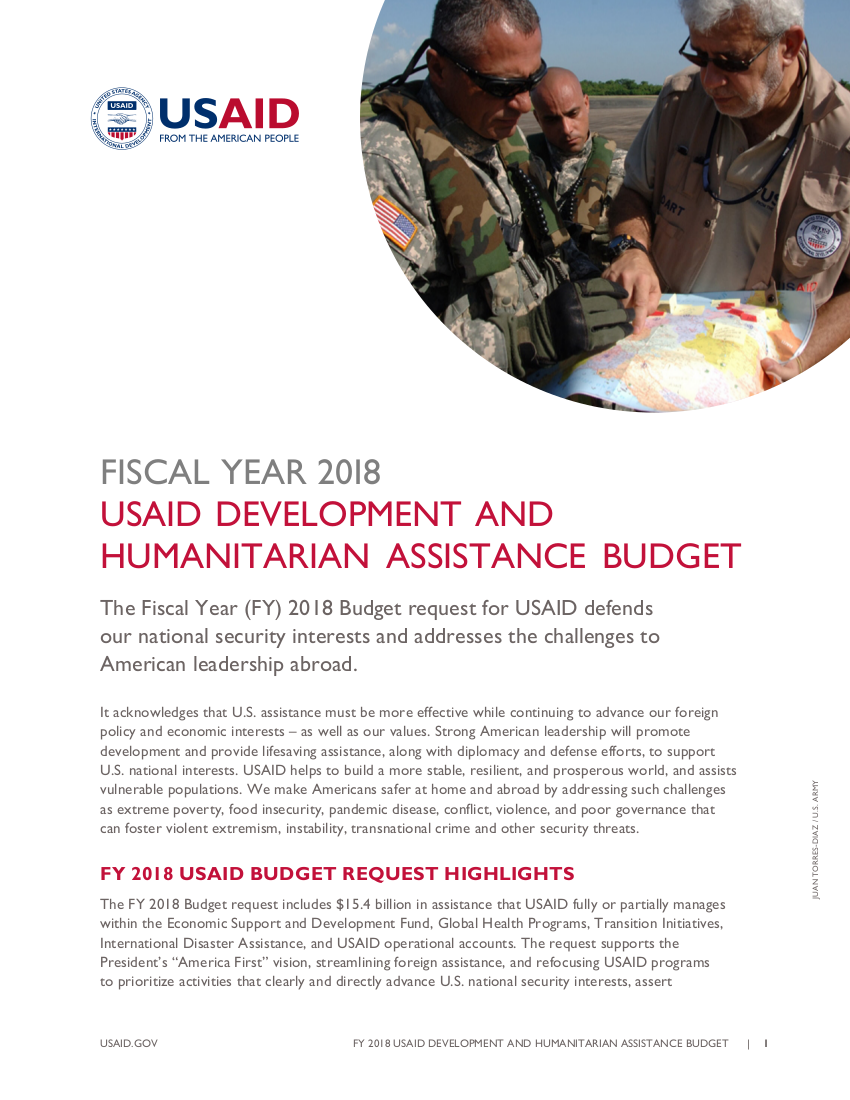The Fiscal Year (FY) 2018 Budget request for USAID defends our national security interests and addresses the challenges to American leadership abroad.
It acknowledges that U.S. assistance must be more effective while continuing to advance our foreign policy and economic interests – as well as our values. Strong American leadership will promote development and provide lifesaving assistance, along with diplomacy and defense efforts, to support U.S. national interests. USAID helps to build a more stable, resilient, and prosperous world, and assists vulnerable populations. We make Americans safer at home and abroad by addressing such challenges as extreme poverty, food insecurity, pandemic disease, conflict, violence, and poor governance that can foster violent extremism, instability, transnational crime and other security threats.
FY 2018 USAID BUDGET REQUEST HIGHLIGHTS
The FY 2018 Budget request includes $15.4 billion in assistance that USAID fully or partially manages within the Economic Support and Development Fund, Global Health Programs, Transition Initiatives, International Disaster Assistance, and USAID operational accounts. The request supports the President’s “America First” vision, streamlining foreign assistance, and refocusing USAID programs to prioritize activities that clearly and directly advance U.S. national security interests, assert U.S. leadership and influence, foster economic opportunities for the American people, and ensure efficiency, effectiveness, and accountability to the U.S. taxpayer.
THE BUDGET REQUEST WILL ENABLE USAID TO:
-
HELP DEFEAT ISIS AND OTHER TERRORIST ORGANIZATION THREATS AND NETWORKS.
Of the $5.6 billion the Department of State and USAID are requesting for this effort, approximately $2.5 billion is in accounts fully or partially managed by USAID and will support our programs focused on defeating ISIS and other terror organization threats in Iraq, Syria, and elsewhere around the world, and promoting stability in areas where these groups metastasize. Programs target the root causes of violent extremism, rebuild economic opportunities and good governance, and also address related complex crises in the Middle East and Africa caused by ISIS, Boko Haram, al-Shabaab, al-Qa’ida, and other extremist organizations. As part of these efforts, resources will also help sustain gains in Afghanistan, and promote a stable, secure Pakistan that counters violent extremism.
-
PROTECT U.S. STRATEGIC INTERESTS IN EUROPE, EURASIA, AND CENTRAL ASIA.
Of the $527.4 million the Department of State and USAID are requesting for this effort, approximately $425.5 million is in accounts fully or partially managed by USAID for programs that help advance a comprehensive strategy to build resilience, reduce vulnerability to Russian aggression and malign influence, and protect U.S. national security and economic interests in Europe, Eurasia, and Central Asia. Funding will also support enduring commitments, such as Chernobyl, health, and education programs.
-
ADDRESS THE ROOT CAUSES OF IRREGULAR MIGRATION TO THE UNITED STATES AND TRANSNATIONAL CRIME IN LATIN AMERICA AND THE CARIBBEAN.
Of the $1.1 billion the Department of State and USAID are requesting for programs in Latin America and the Caribbean, approximately $661.1 million is in accounts fully or partially managed by USAID and will support programs that contribute to a comprehensive effort throughout the region to promote U.S. safety and security by reducing transnational crime and irregular migration to the United States. Programs will address the underlying conditions for these threats by strengthening governance, advancing institutional reforms, improving citizen health and safety, increasing economic opportunity, and advancing human rights.
-
SEIZE EMERGING OPPORTUNITIES TO PROMOTE LASTING STABILITY, PEACE, AND DEMOCRACY.
The FY 2018 request includes $92.0 million in Transition Initiatives funding to address opportunities and challenges to prevent conflict, stabilize emerging democratic processes, and respond quickly to urgent, unanticipated crises in countries critical to U.S. foreign policy.
-
IMPROVE GLOBAL PUBLIC HEALTH AND PREVENT THE SPREAD OF DISEASE.
The FY 2018 request includes $1.5 billion for USAID Global Health Programs. This request supports funding for maternal and child health, including $290.0 million for Gavi, the Vaccine Alliance, which will complete our country’s $1 billion, four-year commitment from FY 2015–2018 and help provide vaccinations for hundreds of millions of children in low-resource countries, saving millions of lives. It also supports the President’s Malaria Initiative and nutrition, as well as combats tuberculosis and neglected tropical diseases.
-
PROVIDE LIFE-SAVING ASSISTANCE TO AREAS WITH THE MOST VULNERABLE POPULATIONS.
The FY 2018 request includes $2.5 billion for USAID humanitarian assistance to aid the victims of conflict and natural disasters, provide emergency food, and address the underlying causes of food insecurity.
-
FOSTER GLOBAL OPPORTUNITIES AND NEW MARKETS FOR U.S. ECONOMIC INTERESTS.
This budget will support economic reforms that level the playing field for U.S. workers and business investments by combating corruption, promoting transparency and accountability, and strengthening market-oriented governance and institutions. USAID will leverage strategic partnerships to advance shared prosperity and open up new markets for U.S. businesses.
-
HARNESS THE POWER OF THE PRIVATE SECTOR.
Through a range of Public-Private Partnerships, USAID will advance and leverage the assets, skills, and resources of private sector partners to drive development and advance shared interests. Recently initiated partnerships are expected to leverage over $5.5 billion from non-U.S. government resources. The request continues support for USAID’s Development Credit Authority, which since 1999 has unlocked over $4.4 billion in private sector lending, at a subsidy cost of $188.0 million.
-
MAXIMIZE THE IMPACT OF EVERY DOLLAR.
USAID will continue to improve accountability and transparency through undertaking rigorous monitoring and evaluation, applying our lessons learned, strengthening program design, and increasing oversight. USAID will continue to improve outcomes, impact, and accountability globally through robust engagement with other donors and stakeholders. In addition, the FY 2018 request includes $71.5 million for the Office of the Inspector General, allowing it to promote efficiency and effectiveness, and prevent and detect fraud, waste, and abuse through its audits and investigations.








Comment
Make a general inquiry or suggest an improvement.